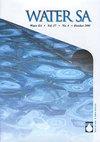线型烷基苯磺酸钠十二烷基磺酸钠(SDS)对甘蓝和龙葵Al、Sr和Mn生物积累的影响
IF 1.2
4区 环境科学与生态学
Q4 WATER RESOURCES
引用次数: 0
摘要
南非主要城市周围用于灌溉的水库的过度富营养化条件促进了线性烷基苯磺酸盐(LAS)和其他污染物(如金属)的共存。鉴于人类健康风险和当地普遍条件,尚未对LAS和金属水用于灌溉作物的综合影响进行适当调查。为了解其潜在危害,通过盆栽试验研究了十二烷基磺酸钠(SDS)对甘蓝和马铃薯植株铝、锰、锶积累的影响。用含有3.48 mg·L−1 LAS(十二烷基磺酸钠)和实地调查测定的Mn (0.257 mg·L−1)、Al (0.6 mg·L−1)和Sr (0.16 mg·L−1)的坝水浇灌20天。灌溉水中与环境相关浓度的SDS并没有增加两株植物对Sr, Mn, Al的吸收,这一点在处理方式(加和不加SDS)上的统计学差异不显著。此外,水中金属、高pH、EC和蓝藻毒素的存在对植物的总叶绿素和生长没有影响。这些发现表明,超富营养化水库中阴离子表面活性剂(如SDS、金属和其他污染物)的普遍水平对作物产量、作物质量和人类健康构成的风险很小,因为这些污染物可能在灌溉植物中积累。尽管该研究报告没有对植物和人类健康造成直接的固有风险,但建议对水、土壤和灌溉植物中的污染物进行持续监测,因为如果汇水区的管理在不久的将来得不到改善,条件、浓度和其他因素可能会迅速改变。本文章由计算机程序翻译,如有差异,请以英文原文为准。
The effect of the linear alkylbenzene sulfonate, sodium-dodecyl-sulfonate (SDS), on the bioaccumulation of Al, Sr and Mn by Brassica oleracea and Solanum tuberosum
The hyper-eutrophic conditions in impoundments used for irrigation around South Africa’s major cities promote the co-existence of linear alkylbenzene sulfonate (LAS) and other pollutants such as metals. The combined effects of LAS and metals, when such water is used to irrigate crops, has not been properly investigated in light of human health risks and prevailing local conditions. To understand the potential risks, pot-culture experiments were conducted to assess the effect of the LAS, sodium-dodecyl-sulfonate (SDS), on the accumulation of aluminum (Al), manganese (Mn) and strontium (Sr) in Brassica oleracea (cabbage) and Solanum tuberosum (potato) plants. The plants were watered with dam water containing 3.48 mg‧L−1 of the LAS (sodium dodecyl sulfonate) and Mn (0.257 mg‧L−1), Al (0.6 mg‧L−1) and Sr (0.16 mg‧L−1) as determined by field surveys, for 20 days. The presence of SDS in the irrigation water at environmentally relevant concentrations did not enhance uptake of Sr, Mn, Al in the two plants, as demonstrated by statistically insignificant differences in the means of the treatments (with and without SDS). In addition, the presence of the metals, high pH, EC and presence of cyanotoxins in the water did not affect total chlorophyll and growth of the plants. These findings imply that the prevailing levels of anionic surfactants such as SDS, metals and other contaminants in the hyper-eutrophic reservoirs pose little risk to crop yields, quality of crops and human health, due to the possible accumulation of these contaminants in irrigated plants. Despite the study reporting no immediate inherent risk to the plants and human health, continuous monitoring of the contaminants in water, soil and irrigated plants is recommended since the conditions, concentrations and other factors can quickly change if the management of the catchment does not improve in the near future.
求助全文
通过发布文献求助,成功后即可免费获取论文全文。
去求助
来源期刊

Water SA
环境科学-水资源
CiteScore
2.80
自引率
6.70%
发文量
46
审稿时长
18-36 weeks
期刊介绍:
WaterSA publishes refereed, original work in all branches of water science, technology and engineering. This includes water resources development; the hydrological cycle; surface hydrology; geohydrology and hydrometeorology; limnology; salinisation; treatment and management of municipal and industrial water and wastewater; treatment and disposal of sewage sludge; environmental pollution control; water quality and treatment; aquaculture in terms of its impact on the water resource; agricultural water science; etc.
Water SA is the WRC’s accredited scientific journal which contains original research articles and review articles on all aspects of water science, technology, engineering and policy. Water SA has been in publication since 1975 and includes articles from both local and international authors. The journal is issued quarterly (4 editions per year).
 求助内容:
求助内容: 应助结果提醒方式:
应助结果提醒方式:


